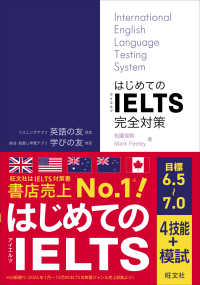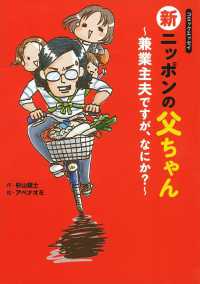- ホーム
- > 洋書
- > 英文書
- > Literary Criticism
Full Description
Beyond African Orality offers the first English translation and interpretation of sixty Wolof Ajami poems (Wolof written with an enriched form of the Arabic script) by Sëriñ Mbay Jaxate (c. 1876-1947), a follower of the Senegalese Muridiyya Sufi order founded by Shaykh Ahmadu Bamba Mbàkke (1853-1927). Sëriñ Mbay Jaxate was one of the greatest Sufi poets of Africa — a wise moralist and an astute social critic, he kept a sharp eye on his compatriots and the unfolding historical, cultural, and religious transformations in his society. His poems focused on praising the virtues of his Sufi master, Shaykh Ahmadu Bamba, and fostering the pursuit of spiritual and moral excellence, which he construed as the best investment to achieve success in this life and paradise in the hereafter.
His Ajami poems capture every facet of rural Wolof farming communities of his time. To communicate more effectively with his audiences, he deployed numerous metaphors drawn from the local fauna, flora, livestock, farming activities, planting and harvesting seasons, sports such as wrestling and target shooting, hunting, culinary habits, and the climate. Unlike his Muslim colleagues who often code-switched between classical Arabic and the local lingua franca of Wolof and included Quranic or Arabic liturgical quotes in their poems, Sëriñ Mbay Jaxate opted to minimize Arabic structures in his work, preferring rural Wolof words for more efficient communication with his agrarian African audiences. His work demonstrates how Ajami has served as a key literary medium and source of knowledge in Muslim Africa.








